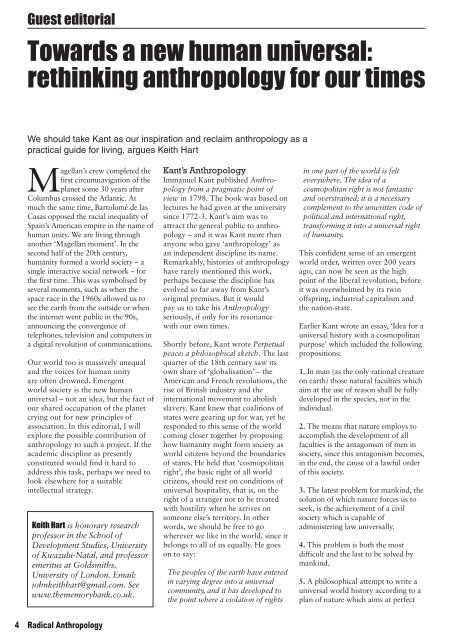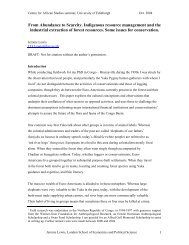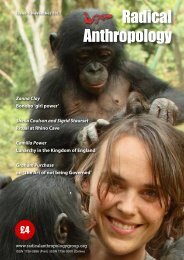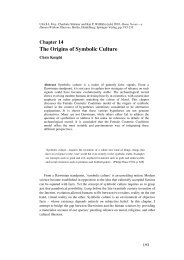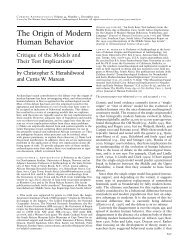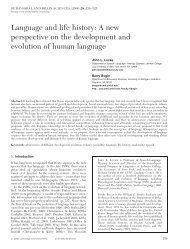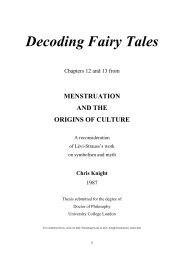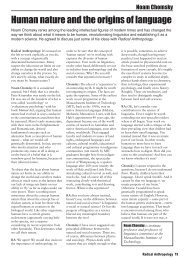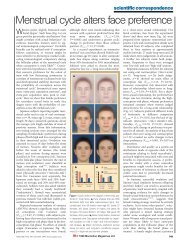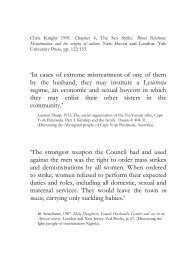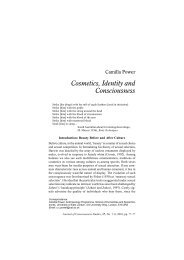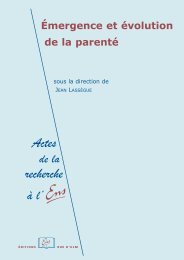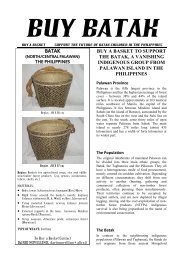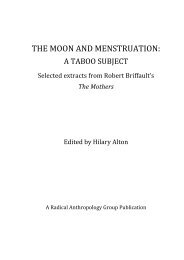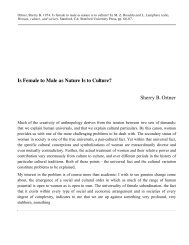The scarcity myth The scarcity myth - Radical Anthropology Group
The scarcity myth The scarcity myth - Radical Anthropology Group
The scarcity myth The scarcity myth - Radical Anthropology Group
You also want an ePaper? Increase the reach of your titles
YUMPU automatically turns print PDFs into web optimized ePapers that Google loves.
Guest editorial<br />
Towards a new human universal:<br />
rethinking anthropology for our times<br />
We should take Kant as our inspiration and reclaim anthropology as a<br />
practical guide for living, argues Keith Hart<br />
Magellan’s crew completed the<br />
first circumnavigation of the<br />
planet some 30 years after<br />
Columbus crossed the Atlantic. At<br />
much the same time, Bartolomé de las<br />
Casas opposed the racial inequality of<br />
Spain’s American empire in the name of<br />
human unity. We are living through<br />
another ‘Magellan moment’. In the<br />
second half of the 20th century,<br />
humanity formed a world society – a<br />
single interactive social network – for<br />
the first time. This was symbolised by<br />
several moments, such as when the<br />
space race in the 1960s allowed us to<br />
see the earth from the outside or when<br />
the internet went public in the 90s,<br />
announcing the convergence of<br />
telephones, television and computers in<br />
a digital revolution of communications.<br />
Our world too is massively unequal<br />
and the voices for human unity<br />
are often drowned. Emergent<br />
world society is the new human<br />
universal – not an idea, but the fact of<br />
our shared occupation of the planet<br />
crying out for new principles of<br />
association. In this editorial, I will<br />
explore the possible contribution of<br />
anthropology to such a project. If the<br />
academic discipline as presently<br />
constituted would find it hard to<br />
address this task, perhaps we need to<br />
look elsewhere for a suitable<br />
intellectual strategy.<br />
Keith Hart is honorary research<br />
professor in the School of<br />
Development Studies, University<br />
of Kwazulu-Natal, and professor<br />
emeritus at Goldsmiths,<br />
University of London. Email:<br />
johnkeithhart@gmail.com. See<br />
www.thememorybank.co.uk.<br />
Kant’s <strong>Anthropology</strong><br />
Immanuel Kant published <strong>Anthropology</strong><br />
from a pragmatic point of<br />
view in 1798. <strong>The</strong> book was based on<br />
lectures he had given at the university<br />
since 1772-3. Kant’s aim was to<br />
attract the general public to anthropology<br />
– and it was Kant more than<br />
anyone who gave ‘anthropology’ as<br />
an independent discipline its name.<br />
Remarkably, histories of anthropology<br />
have rarely mentioned this work,<br />
perhaps because the discipline has<br />
evolved so far away from Kant’s<br />
original premises. But it would<br />
pay us to take his <strong>Anthropology</strong><br />
seriously, if only for its resonance<br />
with our own times.<br />
Shortly before, Kant wrote Perpetual<br />
peace: a philosophical sketch. <strong>The</strong> last<br />
quarter of the 18th century saw its<br />
own share of ‘globalisation’ – the<br />
American and French revolutions, the<br />
rise of British industry and the<br />
international movement to abolish<br />
slavery. Kant knew that coalitions of<br />
states were gearing up for war, yet he<br />
responded to this sense of the world<br />
coming closer together by proposing<br />
how humanity might form society as<br />
world citizens beyond the boundaries<br />
of states. He held that ‘cosmopolitan<br />
right’, the basic right of all world<br />
citizens, should rest on conditions of<br />
universal hospitality, that is, on the<br />
right of a stranger not to be treated<br />
with hostility when he arrives on<br />
someone else’s territory. In other<br />
words, we should be free to go<br />
wherever we like in the world, since it<br />
belongs to all of us equally. He goes<br />
on to say:<br />
<strong>The</strong> peoples of the earth have entered<br />
in varying degree into a universal<br />
community, and it has developed to<br />
the point where a violation of rights<br />
in one part of the world is felt<br />
everywhere. <strong>The</strong> idea of a<br />
cosmopolitan right is not fantastic<br />
and overstrained; it is a necessary<br />
complement to the unwritten code of<br />
political and international right,<br />
transforming it into a universal right<br />
of humanity.<br />
This confident sense of an emergent<br />
world order, written over 200 years<br />
ago, can now be seen as the high<br />
point of the liberal revolution, before<br />
it was overwhelmed by its twin<br />
offspring, industrial capitalism and<br />
the nation-state.<br />
Earlier Kant wrote an essay, ‘Idea for a<br />
universal history with a cosmopolitan<br />
purpose’ which included the following<br />
propositions:<br />
1. In man (as the only rational creature<br />
on earth) those natural faculties which<br />
aim at the use of reason shall be fully<br />
developed in the species, not in the<br />
individual.<br />
2. <strong>The</strong> means that nature employs to<br />
accomplish the development of all<br />
faculties is the antagonism of men in<br />
society, since this antagonism becomes,<br />
in the end, the cause of a lawful order<br />
of this society.<br />
3. <strong>The</strong> latest problem for mankind, the<br />
solution of which nature forces us to<br />
seek, is the achievement of a civil<br />
society which is capable of<br />
administering law universally.<br />
4. This problem is both the most<br />
difficult and the last to be solved by<br />
mankind.<br />
5. A philosophical attempt to write a<br />
universal world history according to a<br />
plan of nature which aims at perfect<br />
4<br />
<strong>Radical</strong> <strong>Anthropology</strong>


